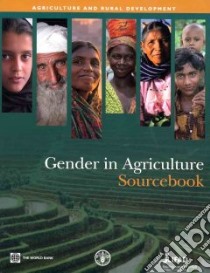Gender in Agriculture Sourcebook - 9780821375877
Un libro in lingua di Bank World edito da World Bank, 2008
- € 34.20
- Il prezzo è variabile in funzione del cambio della valuta d’origine
The 'Gender in Agriculture Sourcebook' provides an up-to-date understanding of gender issues and a rich compilation of compelling evidence of good practices and lessons learned to guide practitioners in integrating gender dimensions into agricultural projects and programs. It is serves as a tool for: guidance; showcasing key principles in integrating gender into projects; stimulating the imagination of practitioners to apply lessons learned, experiences, and innovations to the design of future support and investment in the agriculture sector. The Sourcebook draws on a wide range of experience from World Bank, Food and Agriculture Organization (FAO), International Fund for Agricultural Development (IFAD), and other donor agencies, governments, institutions, and groups active in agricultural development.The Sourcebook looks at: access to and control of assets; access to markets, information and organization; and capacity to manage risk and vulnerability through a gender lens. There are 16 modules covering themes of cross-cutting importance for agriculture with strong gender dimensions (Policy, Public Administration and Governance; Agricultural Innovation and Education; Food Security; Markets; Rural Finance; Rural Infrastructure; Water; Land; Labor; Natural Resource Management; and Disaster and Post-Conflict Management) and specific subsectors in agriculture (Crops, Livestock, Forestry, and Fisheries). A separate module on Monitoring and Evaluation is included, responding to the need to track implementation and development impact. Each module contains three different sub-units: (1) A Module Overview gives a broad introduction to the topic and provides a summary of major development issues in the sector and rationale of looking at gender dimension; (2) Thematic Notes provide a brief and technically sound guide in gender integration in selected themes with lessons learned, guidelines, checklists, organizing principles, key questions, and key performance indicators; and (3) Innovative Activity Profiles describe the design and innovative features of recent and exciting projects and activities that have been implemented or are ongoing.
Informazioni bibliografiche
- Titolo del Libro in lingua: Gender in Agriculture Sourcebook
- Lingua: English
- Autore: Bank World
- Editore: World Bank
- Collana: World Bank (Paperback)
- Data di Pubblicazione: 01 Gennaio '08
- Genere: SOCIAL SCIENCE
- Argomenti : Women in agriculture Women agricultural laborers Agricultural laborers
- Pagine: 764
- Dimensioni mm: 273 x 209 x 44
- ISBN-10: 0821375873
- EAN-13: 9780821375877


